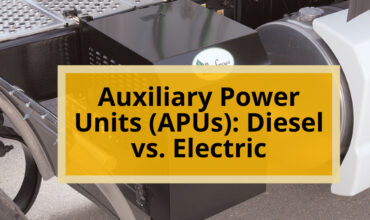Fuel costs are a significant expense for owner-operators in the transportation industry. As such, finding ways to reduce fuel expenses can translate to higher profits and a more sustainable business model. In this article, we will explore four proven methods for fuel optimization for owner-operators.
By examining driving habits, equipment upgrades, maintenance, and trip planning, we will provide an in-depth analysis of how to save thousands of dollars annually and maximize fuel efficiency. As an owner-operator, it is essential to understand that even small changes in driving habits can have a significant impact on fuel consumption.
By adopting fuel-efficient driving techniques, such as maintaining a consistent speed and avoiding sudden acceleration and braking, owner-operators can reduce fuel expenses significantly. Additionally, investing in the right equipment, such as aerodynamic features and fuel-efficient engines, can also help reduce fuel consumption.
Regular maintenance and monitoring of equipment are also crucial in ensuring optimal fuel efficiency, as minor issues can lead to significant fuel waste over time. Finally, trip planning can help owner-operators optimize their routes and avoid unnecessary detours, reducing fuel consumption and saving money.
By implementing these fuel optimization tips, owner-operators can achieve a more sustainable and profitable business model.

Driving Habits
In terms of fuel optimization for owner-operators, driving habits play a crucial role, as they act as the wheels that steer the truck towards lower fuel expenses, much like a captain steering a ship to calmer waters amidst a stormy sea.
Fuel efficient driving techniques, such as reducing speed, can have a significant impact on fuel consumption. For instance, every 5 mph over 50 will cost an extra $0.19 per gallon. By reducing speed to 55 and improving miles per gallon to 8, owner-operators can save $18,200 annually. Furthermore, using cruise control and maintaining a steady speed on flat, straight stretches can also help reduce fuel expenses.
Another factor that can affect fuel consumption is weather conditions. During cold weather, fuel efficiency can be reduced by up to 12% due to the thicker oil and increased air resistance. Similarly, during hot weather, fuel efficiency can be reduced by up to 20% due to the increased air conditioning use. Therefore, owner-operators should be mindful of weather conditions and adjust their driving habits accordingly to optimize fuel consumption.
By implementing these fuel efficient driving techniques and being aware of the impact of weather conditions on fuel consumption, owner-operators can significantly reduce their fuel expenses and increase their bottom line.
also read : Efficient Fuel For Generators: Diesel, Natural Gas, Or Gasoline?
Equipment
Devices such as newer automatic transmissions, APUs, and aerodynamic equipment can significantly improve the efficiency of a truck’s fuel consumption. For instance, automatic transmissions have the ability to select the right gear at the right time, reducing excessive fuel waste during shifts.
Additionally, buying an APU can reduce fuel consumption to one gallon a day, saving an owner-operator up to $4,095 annually. Furthermore, devices like Flow Below, Air Tabs, wheel covers, and trailer skirts can increase MPG from .2-1 MPG, making them a worthwhile investment for any truck driver looking to reduce fuel expenses.
In addition to these devices, regular maintenance of trucks can also help reduce fuel consumption. For instance, performing pre- and post-trip inspections can help detect defects that can lead to excessive fuel consumption and repairs. Proper tire inflation, axle alignment, and the use of tires with the best rolling resistance can also improve fuel mileage.
Moreover, carrying an extra fuel filter can safeguard against fuel gelling up due to weather conditions, while regularly replacing fuel and oil filters can ensure proper lubrication for the engine. All of these fuel-efficient technologies can help owner-operators save on fuel expenses, making them an integral part of any successful trucking operation.
Maintenance and Monitoring
Proper maintenance and monitoring practices are like the keys to a well-oiled machine, as they can ensure that a truck is running efficiently and not wasting unnecessary resources. Regular inspections of vital components such as the fuel filter can prevent clogging and ensure that the engine is receiving the correct amount of fuel. Additionally, taking oil samples can diagnose any internal problems with the engine, allowing for preventative measures to be taken before more significant and costly issues arise. By following a preventive maintenance schedule, owner-operators can safeguard the proper lubrication of their engine and ensure that their vehicle is running at optimal performance levels.
Monitoring critical safety events can help identify mistakes, improve driving habits, and optimize fuel consumption. Reducing idle time can also significantly reduce fuel consumption. For example, idling a truck can burn a gallon of fuel per hour, which can add up quickly over time. By monitoring their idle time and limiting it as much as possible, owner-operators can save on fuel costs and increase their bottom line. Overall, proper maintenance and monitoring practices are essential for fuel optimization and can help owner-operators save thousands of dollars annually.
| Importance of Maintenance Checks for Fuel Optimization | Idle Time, Safety Events: Monitoring for Optimal Fuel Consumption |
|---|---|
| Regular inspection of fuel filter can prevent clogging and ensure proper fuel flow | Monitoring critical safety events can help identify mistakes and improve driving habits |
| Taking oil samples can diagnose internal engine problems | Reducing idle time can significantly reduce fuel consumption |
| Preventive maintenance schedule can ensure proper lubrication of the engine | Monitoring idle time can save on fuel costs over time |
| Regular replacement of fuel and oil filters can safeguard proper lubrication | Monitoring can optimize fuel consumption and increase bottom line |
Frequently Asked Questions
What are some commonly overlooked factors that can affect fuel efficiency for owner-operators?
Driver behavior, such as excessive speed and hard braking, can negatively impact fuel efficiency for owner-operators. Proper vehicle maintenance, including tire inflation and axle alignment, can also affect fuel consumption.
How can owner-operators balance the need for fuel efficiency with the demands of their specific job or industry?
Balancing fuel efficiency and industry-specific challenges is crucial for owner-operators. Technology solutions like automatic transmissions and APU systems can help reduce fuel consumption without compromising performance.
Are there any tools or resources available to help owner-operators track and optimize their fuel usage?
Fuel optimization tools and fuel tracking resources are available for owner-operators. These tools can monitor fuel usage, identify inefficiencies, and track expenses. Utilizing these resources can help improve fuel efficiency and save money.
How do weather conditions and seasonal changes impact fuel efficiency for owner-operators?
Driving habits, maintenance practices, and route planning are key to fuel efficiency for owner-operators, but weather conditions and seasonal changes can impact fuel efficiency. Proper maintenance and driving habits can mitigate these effects.
What are some potential long-term benefits of investing in fuel optimization strategies as an owner-operator?
Investing in fuel optimization strategies as an owner-operator can lead to long-term cost effectiveness and a competitive advantage in the market. Proper maintenance and driving habits can save thousands of dollars annually while reducing fuel expenses.






